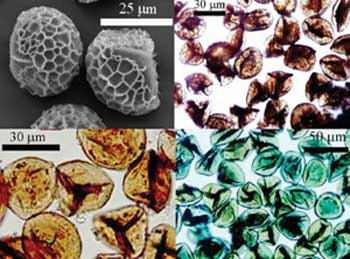| Posted: January 30, 2007 |
Pollen filled with nanomaterials to deliver drugs |
|
(Nanowerk News) Pollen capsules that can be filled with nanomaterials could be used for drug delivery, say scientists.
|
|
Some plant pollens can cross the gut wall where they are destroyed within the blood stream, releasing their contents. This has led researchers to investigate pollen as possible drug delivery vehicles.
|
|
Vesselin Paunov at University of Hull, UK, and colleagues have developed a way of filling pollen capsules with nanomaterials ("Sporopollenin micro-reactors for in-situ preparation, encapsulation and targeted delivery of active components"). Paunov says the method will allow sporopollenin, the material that makes up the outer layer of pollen, to be used in pharmaceutical and cosmetic formulations.
|
|
The researchers used the sporopollenin capsules as chemical micro-reactors, adding starting materials and then allowing a chemical reaction to generate the product inside the pollen. Paunov's team used this method to fill pollen capsules with organic, inorganic and magnetic nanoparticles.
|
 |
| Sporopollenin microcapsules from Lycopodium clavatum loaded with a range of inorganic and organic nanomaterials. (Image: Chemistry World)
|
|
"Future developments may include preparation of "stealth" sporopollenin capsules which have longer circulation time and provide controlled release. Advances also may include functionalisation of the outer surface of the capsules that specifically bind to particular types of biological tissues," said Paunov.
|
|
Orlin Velev, a biomaterials researcher at North Carolina State University, US, said the work represents a beautiful example of the convergence of natural and man-made materials on the microscale. "The creative use of capsules of biological origin as reactors for nanoparticle synthesis illustrates the richness of approaches that can be used in the fabrication of new biomimetic materials with potential applications in drug delivery and biomedical technologies," he said.
|

